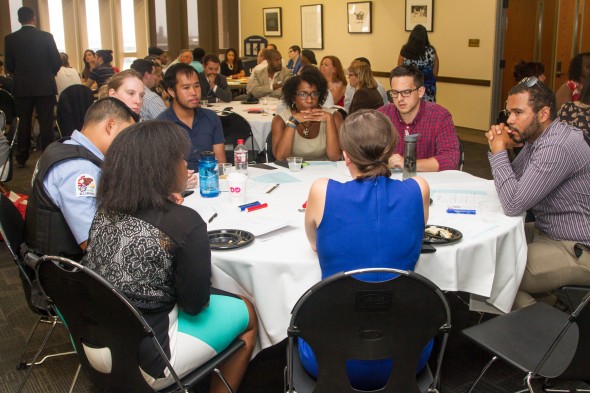Finding hope after violence

Members of the UIC community addressed critical issues concerning gun control, violence, police brutality, racism, campus safety and more during a reflection event. Photo: Vibhu Sreevatsa Rangavasan
Nearly 100 members of the UIC and Chicago communities came together at Student Center East July 14 to reflect, heal, engage in dialogue and remember the recent victims of violence in an event organized by Student Affairs and campus partners.
The group addressed tragic events — which have happened in places like Chicago, Minneapolis, Falcon Heights, Orlando, Dallas and Baton Rouge, among others — and discussed critical issues concerning gun control, violence, police brutality, racism, social movements, protests, campus safety and emotional impacts.
“While carrying the burden of pain, we must continue to be shocked and outraged about violence so that we never become desensitized,” Vice Chancellor for Student Affairs Barbara Henley said.
“We must think about it, we must feel it. That is what spurs us to action, that is what brings us together today: to reflect on the precious lives who have departed and to heal.”
Participants shared stories and perspectives with others in the room.
“We’re here to create a safe space,” said Joseph Hoereth, director of the Institute for Policy and Civic Engagement. “Where you can speak from your heart.”
Community partners and representatives from the Gender and Sexuality Center, Counseling Center, UIC Police, College of Urban Planning and Public Affairs, Latino Cultural Center, African American Academic Network, Office of Medical Advancement, Center for Student Involvement, Campus Auxiliary Services and Office of Sustainability attended to see how their offices could help students, staff and faculty.
“This dialogue speaks to the strong sense of community at UIC,” Hoereth said. “We’re expected to be challenged with what happens next, and we want to figure out how we can respond to it and how to support others.”
“We have a long way to go,” noted Gerardo Nava, a junior in the College of Liberal Arts and Sciences. “But today’s conversations were interesting, and it was a nice bit of therapy.”
“We’re just scratching the surface,” Hoereth said near the conclusion of the talk. “But that’s a good starting point for moving forward: hope.”
